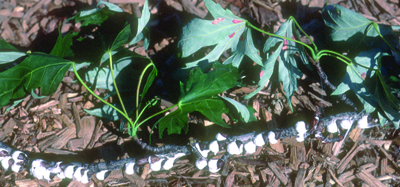Cottony maple scale
July 30, 2015
Pulvinaria innumerabilis
Cottony maple scale is found primarily on silver maple and honeylocust; rarely on alder, box-elder, catalpa, elm, dogwood, hackberry, hawthorn, crabapple, oak, plum, pear, cherry, linden, lilac, willow, beech, poplar, and sycamore. These insects overwinter as immature females on twigs. Females mature and white egg sacs develop in June, when ‘Snowmound’ spirea or mock-orange are in full bloom. Copious amounts of honeydew may be produced. Look for crawlers as littleleaf linden begins bloom, or Hydrangea arborescens ‘Grandiflora’ or ‘Annebelle’ are in full bloom. Crawlers live on the leaves near veins during summer and migrate back to twigs in fall before the leaves drop.

Egg sacs of cottony maple scale.
Management
Twice-stabbed lady beetles and certain wasps and flies are among the natural enemies that help to control cottony maple scale. Insecticides are rarely needed in the landscape due to natural enemies and tolerance of trees.
Print a PDF of this page: Cottony maple scale.



 Print
Print Email
Email



